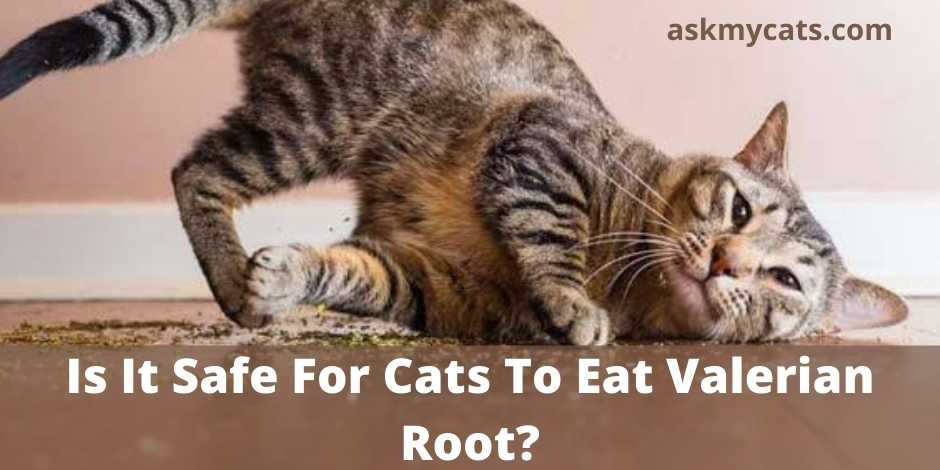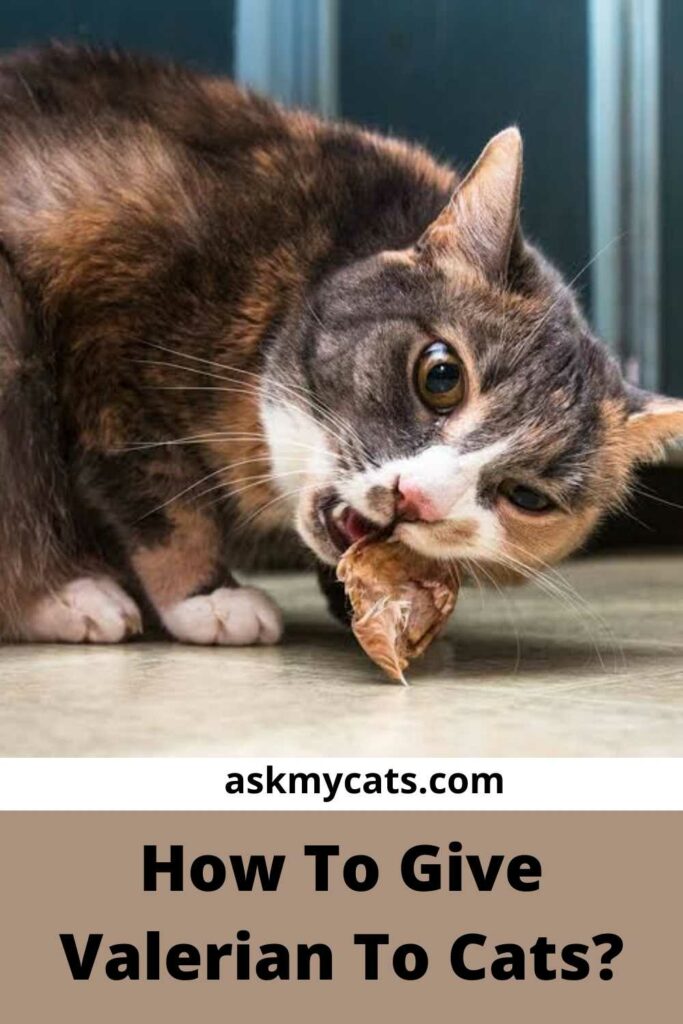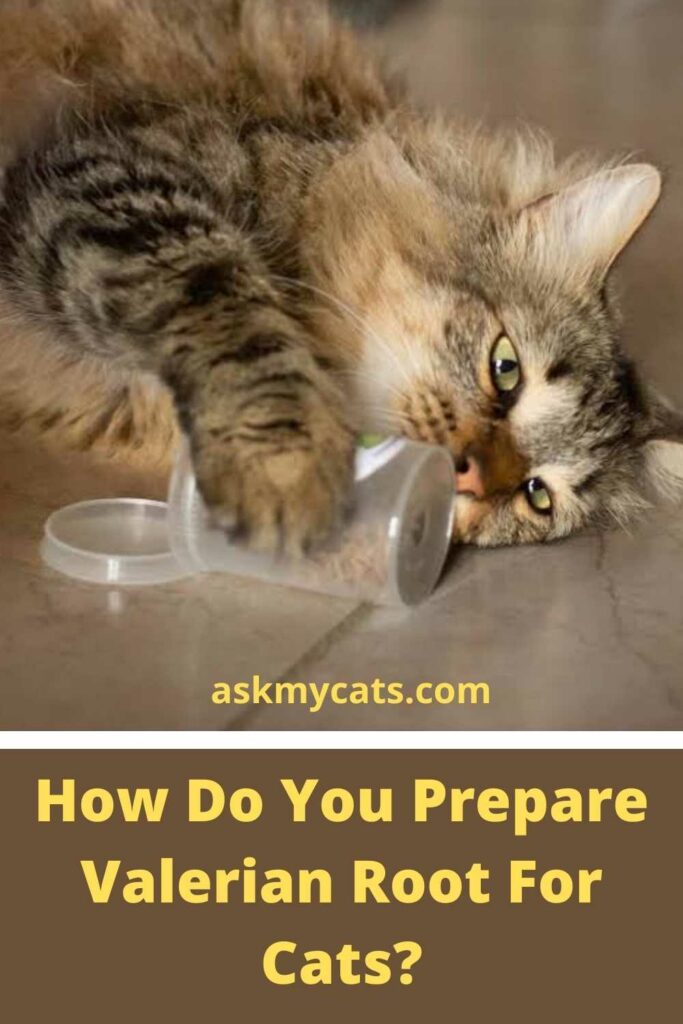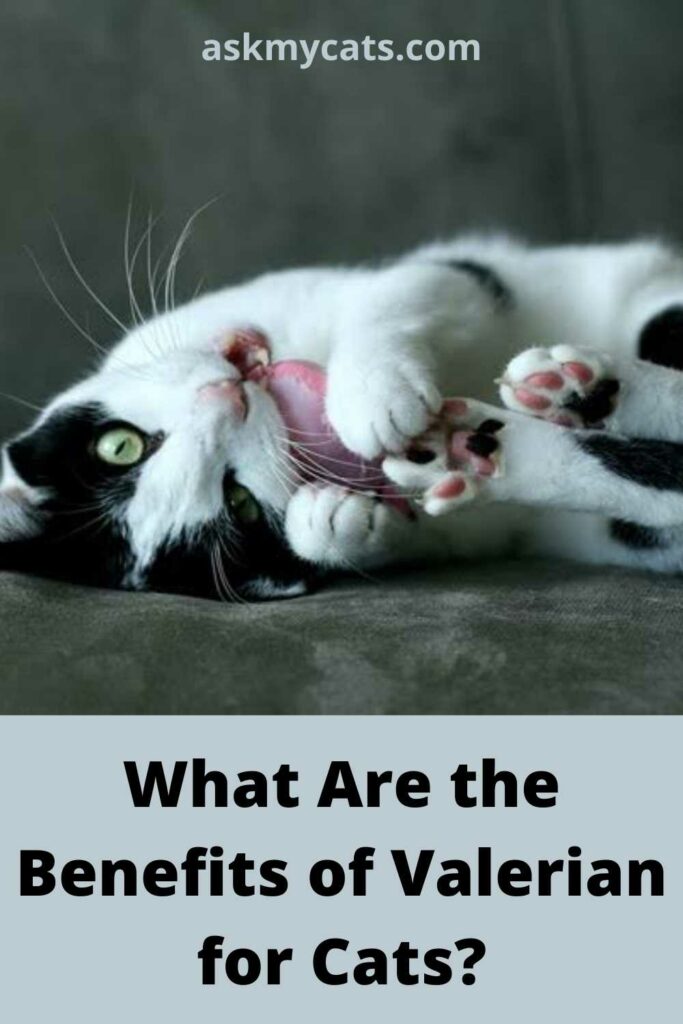Valerian root is a plant that has been used to treat anxiety, sleeplessness, and high blood pressure in individuals. The nervous system of humans is also calmed by it.
Valerian Root’s effect on cats is solely due to the fragrance of the essential oils, which are considered to imitate cat pheromones that make them feel playful or affectionate. It is not a medication that they consume or metabolize, and there are no long-term consequences.
Yes, it is safe for cats to eat valerian root. However, you should be aware that the fragrance might be rather strong. The effects generally last five to thirty minutes, and small kittens that haven’t achieved maturity may not respond until they’re a little older.
If you want to know more about the relationship between your feline and their love for valerian roots, keep reading


Give Your Cat the Perfect Day
Get the Free Ebook!
Can Cats Eat Valerian Root?
Yes, cats can eat valerian root. Dried valerian root, which is a lesser-known alternative to catnip, is a stimulant for cats.
This spicy herb has a reputation for making sedentary cats more active. Valerian is a fantastic indoor cat garden choice.
Is Valerian Root Safe For Cats?
Valerian Root is not only harmless, but it can also be useful to your cat. It helps house cats that prefer to lounge around all day relieve tension and anxiety while also encouraging play and exercise.
It also aids in the development of a relationship between the pet parent and the cat. In the proportions used in play, Valerian Root is totally safe for your cat to sniff and consume.
Valerian root is safe for your cat as it is impossible to overdose on, become addicted to, go through withdrawal from, or create any long-term bodily consequences. This is because the valerian root is not metabolized.
How Does Valerian Root Affect Cats?
Some cats are stimulated by the actinidine in valerian root when they are exposed to it. Often, these cats would start rolling around, playing, and appearing ecstatic.
They could drool as well. Because cats prefer to run, pursue, and pounce after being exposed to valerian root, the playful sensation that appears to be produced by it gives mental stimulation and, in many cases, exercise.
Some cats may respond to valerian root even if they aren’t allergic to catnip. Some cats don’t appear to react to valerian as well as others.
It’s conceivable that a cat exposed to valerian root will become more aggressive than normal. It’s crucial to keep a watchful eye on your cat the first few times you administer valerian root.
If you notice symptoms of aggressiveness in your cat, such as growling, hissing, or resting his ears back on his head, step aside and let him return to normal without interfering.
Can Cats Overdose On Valerian?
Valerian root is a herbal supplement derived from the Valeriana Officinalis plant that has a broad safety margin.
If cats consume high doses of valerian, they may have an overdose.
If your feline companion consumes too much of this drug, symptoms such as shakiness on the feet, low body temperature, and drowsiness may occur. Therefore, keep an eye on the amount of valerian root your cat ingests.
How Much Valerian Is Safe For Cats?
Valerian is safe for your feline companion when given in small amounts. However, if she ingests huge amounts of valerian root, it might cause complications.
Give your cat a lesser dose of valerian when you first offer it to him. This will allow you to see how your cat reacts to it. The amount of valerian can then be adjusted accordingly.
Are Cats Attracted To Valerian?
Individual cats react differently to valerian. Cats may frequently rub themselves on a valerian toy. That’s a fantastic method to find out if your cat enjoys valerian root.
On the other hand, cats may also appear to derive some sort of energy from the odor. They’ll be very active and gallop about the room.
When provided with a valerian toy, cats who adore it become quite calm. They just drool while holding the toy and may appear perfectly relaxed. It’s similar to how cats react when they consume valerian root treats as the treats make them feel calmer.
Why Do Cats Like The Smell Of Valerian?
Valerian root makes cats feel euphoric, so they like sniffing it.
However, some cats lack the gene that causes them to enjoy catnip. Valerian is a fantastic alternative to catnip for cats that don’t like it.
Does Valerian Calm Cats?
Valerian root has a calming effect on felines. Flowers, teas, essential oils, and tinctures are all examples of valerian root products.
Essential oils should never be given to cats since they interfere with their liver’s functions. Dried herbs are the safest form of herbs for cats. Tinctures are also not advised for cats.
Please keep in mind that while herbs might be useful, not all cats will react positively or at all to them.
Give your feline the valerian fifteen minutes before the planned stressful event for optimum benefits. The cat will quickly recover from the first shock.
Don’t be shocked if she nods out shortly afterward. The herb is also given to people who have trouble sleeping, and it has the same effect on cats. The plant causes euphoria, which makes your cat more docile than you may expect.
Does Valerian Root Make Cats Sleepy?
Cats that smell and eat valerian have better sleep because of its calming impact. Valerian is a fantastic method to settle down and give your cat a good night’s sleep if she’s having problems sleeping or is hyperactive.
However, we recommend you use it in small amounts so that your cat may enjoy it healthily.
How To Give Valerian To Cats?

There are several cat toys on the market that include valerian root. Some pet parents also offer their cats a tiny amount of dried, finely chopped root. If you do this, make sure the piece is tiny enough to avoid choking and only offer a small quantity at a time.
Human valerian root supplements, tablets, or liquids should not be given to your cat since they may be too powerful or include other chemicals that are dangerous to cats.
We recommend that you store your valerian root or valerian cat toys in a locked container between usage since it has a strong odor that many people find offensive.
1. Use Valerian-Containing Cat Toys
Pet toys containing valerian are available in the same manner as catnip-filled toys are available to encourage your cat to play. You may also come across toys that contain a combination of catnip and valerian, which is an option if you know your cat likes catnip.
However, if you’re handy and like to do things yourself, you may build your own cat toys out of valerian that you buy or cultivate yourself.
2. Sprinkle Valerian On Scratching Post
If you’ve ever sprinkled catnip on a scratching post, you know how fast your cat will be drawn to it, and you might be shocked by how enthusiastic he is to begin using a scratcher that he previously ignored.
You may use the same approach with valerian. A pinch of dried valerian root can be used to introduce your cat to a new scratching post or to distract his focus away from your furniture so he doesn’t claw it.
Hideaways like cat condos are another place where dried valerian root might be sprinkled. If your pet enjoys escaping to those peaceful little nooks, he may be even more content if he discovers some valerian in there
How Do You Prepare Valerian Root For Cats?

You may offer your cat Valerian in its natural form in a variety of ways. To release the strongest aroma, it is usually roughly cut into little pieces.
Because your feline’s sense of smell is so acute, a few pinches will go a long way. Sprinkle on the floor where you want your cat to play, and they’ll roll around in it, smelling it.
You can also place the Valerian in a reusable toy to extend the time your cat enjoys each feeding while also containing the mess.
This simple liquid may instantly soothe frightened, nervous, energetic, and disturbed animals. It can be dropped into the mouth, sprinkled on food, or even a few drops can be dusted on a pet’s bedding. It might result in a more agreeable pet, making doctor appointments, travel, and moving house less traumatic.
Valerian compound is highly appealing to cats, making administration a breeze. The concentrated plant extracts in this drink cause a visible shift in behavior in just 30 minutes without inducing sleepiness, and the effects are short-lived.
Phobias and neurological illnesses may be extremely difficult to cope with, both for cats and their owners. This herbal medication is often used to treat noise phobias and anxieties connected with fireworks, thunder, as well as overall excitability and hyperactivity.
What Are the Benefits of Valerian for Cats?
Valerian has steadily been accepted by pet owners and applied to cats during the last few decades. It has the same impact on them, much to their astonishment. When cats are fed valerian, they become happy or euphoric.
The benefits of valerian root for cats are:

1. Relaxation
The major advantage of valerian for cats is that it relaxes them. Actinidine is a substance found in Valerian. Both people and animals have been reported to benefit from this substance.
2. Improved Sleep And Calm
Cats that smelled and ate valerian had better sleep because of its calming impact. Valerian is a fantastic method to settle down and give your cat a good night’s sleep if he’s having problems sleeping or is hyperactive.
3. Attracting Your Cat
Allowing your cats to utilize cat posts, toys, and beds might be challenging at times. If you’re trying to get your cat to try something new and she’s not interested, try sprinkling valerian roots or leaves on top of it. The odor of valerian will entice your cat and pique his attention. This should encourage her to use items.
4. Reduced Aggressiveness
Aggression should gradually diminish as valerian keeps your cat calm and contented. When your cat likes to fight, this will help you control him
Frequently Asked Questions
Will Valerian Root Hurt My Cat?
No, valerian root will not hurt your cat. Valerian is completely safe for cats and has a similar effect to catnip.
Is Catnip The Same As Valerian?
Valerian is frequently associated with catnip, although the two are not interchangeable. Catnip is a kind of mint known as Nepeta Cataria. The herb itself, like valerian, does not appear to be capable of inducing pleasure in cats everywhere over the world.
Can Cats Overdose On Valerian?
Yes, cats can overdose on valerian. If a pet consumes too much of this drug, symptoms such as shakiness on the feet, low body temperature, and drowsiness may occur.
Final Words
Valerian is an excellent and safe alternative to catnip. When looking for valerian goods for cats, you could come across pills and sprays that contain it as a component for creating joyful sensations in your feline companion.
If you want to utilize valerian root as a natural cure for your kitty’s discomfort, go to your veterinarian first to obtain the information you need and to learn how to safely and effectively deliver this herb to your feline buddy.
Drop down your doubts and queries regarding your feline companion in the comment section below and we’ll answer them soon!
